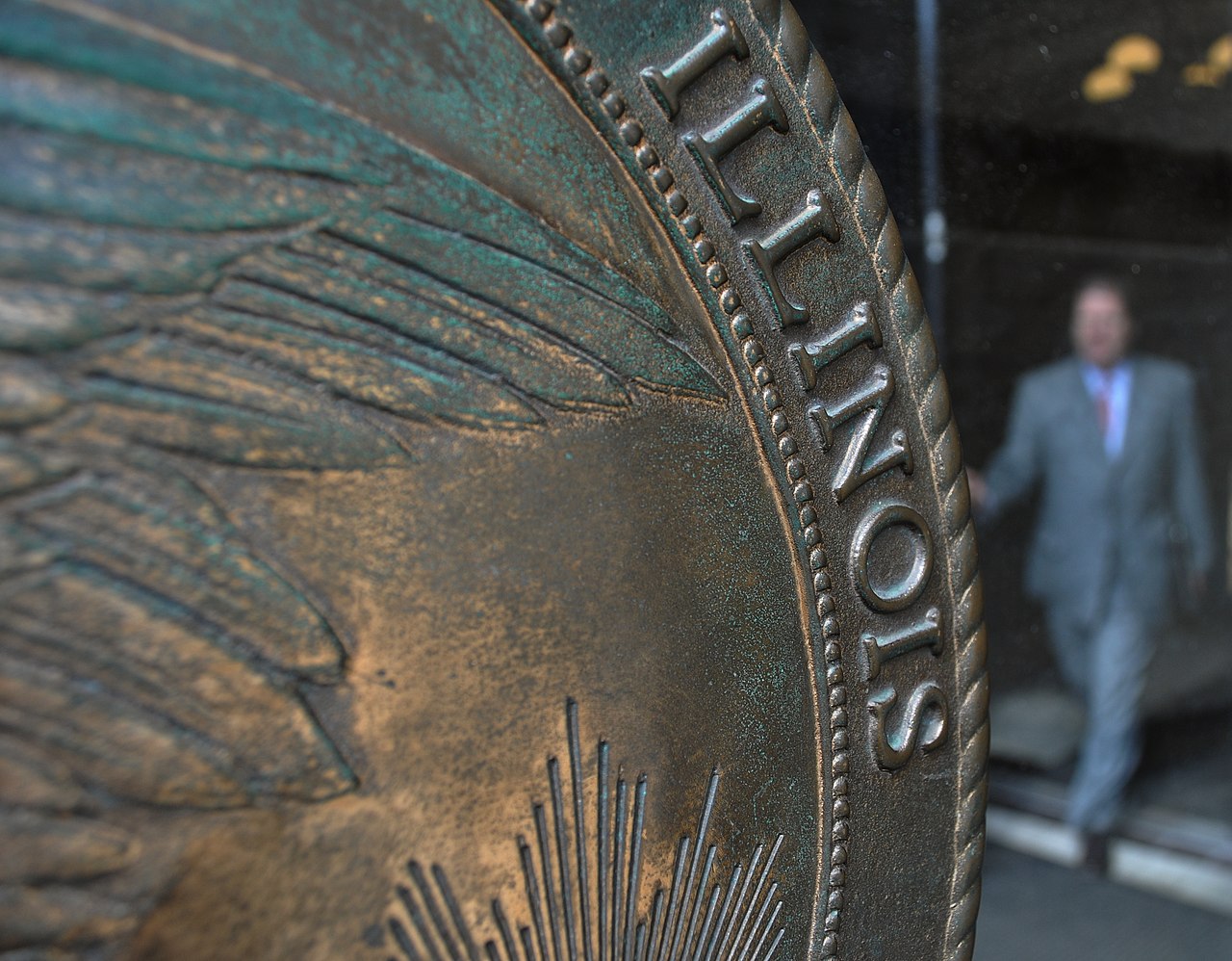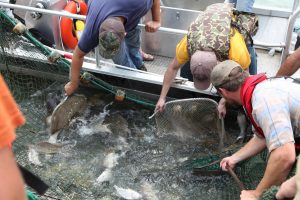
But Illinois remains opposed to Snyder’s preferred Army Corp plan
Michigan Gov. Rick Snyder gained a welcome if largely symbolic ally in his fight against Asian carp last week when the city of Chicago joined the governor’s Block Asian Carp coalition.
Snyder formed the group in January to prompt the Army Corps of Engineers to move forward with a plan to establish a carp choke point at Brandon Road Lock near Joliet, Illinois. If implemented, modifications to the lock would reduce the risk of carp getting into Lake Michigan.
The plan is estimated to cost $275 million and has a requirement that a non-federal entity incur the $8 million annual maintenance expense of the lock. Snyder has been seeking funding sources, but says Michigan may be willing to absorb the expense as a backstop.
Chicago joins Wisconsin, Ohio and Ontario, Canada in Snyder’s coalition. Other Great Lakes states including Illinois have not joined.
In a carefully worded statement in a Michigan Department of Natural Resources press release, Chicago Mayor Rahm Emanuel said the city “takes our responsibility to preserve and protect the Great Lakes seriously, and we are proud to stand with our regional partners in the fight against the threat of invasive species.”

Chicago Mayor Rahm Emanuel , courtesy of Daniel X. O’Neil
Emanuel said he hoped “other Illinois leaders will step up and join in this essential plan.” The release said Chicago’s role in the coalition would be to provide policy support.
Emanuel’s office did not make an announcement on its participation in the coalition and did not respond to a Great Lakes Now inquiry to comment.
In January, Snyder said he hoped to take advantage of unallocated federal funds that Chicago’s Metropolitan Water Reclamation District (MWRD) has that could be used for the non-federal funding requirement.
MWRD was created by a state law and has no official connection to the city of Chicago.
In January MWRD told Great Lakes Now that “the funds could be made available” but said the agency does not support the Army Corps’ Brandon Road Lock plan.
In response to a Great Lakes Now inquiry on Chicago’s decision to join the Michigan coalition, MWRD’s Executive Director David St. Pierre provided a clarification on the money and why it would likely not be available.

David St. Pierre, Executive Director MWRD, courtesy of mwrd.org
“Allocating advances funding from Army Corps projects can be made available,” St. Pierre said.
“If we were to entertain making funds available for Brandon Road, it could be done through an intergovernmental agreement with the State of Illinois. I know Illinois is not interested in supporting the current plan as presented. Therefore, I would not entertain even bringing this request forward for consideration,” St. Pierre said.
He said “MWRD cannot be a direct sponsor on this project.”
Long-standing opposition
To St. Pierre’s point, Illinois has long-opposed any structural changes to its waterways needed to minimize the risk of Asian carp reaching Lake Michigan. It’s supported by shipping interests like barge operators who fear a disruption of their operations.
The state fights carp with an aggressive fishing program to cull mass quantities of Asian carp from waterways before they get to the electric barriers operated by the Army Corps that repel advancing carp.
Illinois recently held an Asian carp fish cull demonstration event where Lt. Governor Evelyn Sanguinetti told the media the state is catching 93 percent of the leading edge of the carp advance.
The program is largely supported by the federal Great Lakes restoration program.
Enter Illinois politics
Former Great Lakes executive Cameron Davis has been working on the Asian carp advance since 2003 when, as an advocate, he lobbied Congress for money for the first electric barriers. While at the U.S. EPA during the Obama administration, Davis served on a regional committee focused on Asian carp.

Cameron Davis, courtesy of EPA
He recently told Great Lakes Now that he supports a multi-tiered approach to reduce the carp risk that could include mechanical solutions like the lock modification at Brandon Road, and managerial solutions like Illinois’ fish cull program.
He said fishing down of the carp population that Illinois is doing is a “difficult but effective approach to invasive species management.”
Ironically, Davis is the leading candidate to serve out a vacant seat as a commissioner on MWRD’s board where his Asian carp experience could be valuable if the agency became one of those leaders that Emanuel asked to “step up.”
But Illinois Gov. Bruce Rauner, who has authority over the agency, recently filled the position outside of the election process. Final election results have not been released but Davis is the likely winner. A court may have to decide if Rauner’s appointment can supersede an election.

Illinois Governor Bruce Rauner, courtesy of JanetandPhil
Rauner is a Republican and is up for re-election in November. He is frequently at odds with the Chicago political establishment which is historically Democratic and where Davis has close ties.
Chicago Mayor Rahm Emanuel stands for re-election in early 2019. Contributing money to stop carp could be a tough sell for Chicago when the city’s budget is stressed to pay teacher pensions, police, schools and basic services.
If the Brandon Road project is authorized and funded by Congress, it’s estimated to be operational by 2025.
Separate, Gov. Snyder last week announced the winner of his Great Lakes Invasive Carp Challenge, a contest which invited innovators to develop methods to keep invasive carp out of the Great Lakes.
Massachusetts software consultant Edem Tsikata won the top prize of $200,000 for a propelled bubble technology that emits high-speed jets of water designed to repel carp.
The Nature Conservancy’s Dave Hamilton took second place and $125,000 for a lock treatment system that would kill carp. Hamilton works in the Conservancy’s Lansing office.
Snyder said “the solutions presented will help take us one step closer to ensuring our waters remain free of this dangerous and harmful invasive species.”
2 Comments
-
What I was saying, these Carp jump when they hear loud noises from the Prop’s. and other things, maybe even light, electric jolt, anyway we seen & know that. So at some of the Bottleneck areas put up catch screen from bank to bank . Down river, in a few spots (100) get a few dredges working (like they did when I was a kid, to clean the Canals) use them for setting up for the Conveyor Belts. From what I understand these fish have No use, meaning people have found Zero use. So I say grind them up and make fertilizer from them. If done right you could make money on it, it might cost a few bucks up front, but those stinky fish could do some good turned into compost (mixed with clippings and other green waste you’d of done two things, get rid of that fish that might ruin our GREAT LAKES!! The sad thing they seen this coming for years and did nothing, nothing. Now they’ve moved up to the Great Lakes, were in a hurry….and better be. We better stop this, we seen it coming and did nothing….now set up groups, more paperwork, with No boots on the ground. We know the problem, and talk about it, if we mess this up, lose the fishing in the Great Lakes, We’d be real jokes. Better Stop this one.
-
Everyone knows money is power. I have been saying for over a year if Nestle cares like they say they do, like this quote from Nestle’s Ice Mountain Resource Manager Arlene Anderson-Vincent gave us this statement: “People are passionate about water and so are we. Nestlé Waters North America (NWNA) shares the same deep commitment to the people and natural resources of Michigan with all of the state’s citizens.” My question is, if that is true then why won’t they use some of the BILLIONS of dollars they’ve made by stealing our water to help us fight the Asian Carp invasion? The carp, if left unchecked, will ultimately systematically destroy the great lakes, starting with Lake Michigan. Not to mention the oil pipes leaking into the lakes in the straits. It appears Nestle only has concerns about their own greed. They gave water stolen from Lake Michigan to Flint to make themselves look benevolent after all of the public outcry…all a farce. Still greasing palms and worshiping the mighty dollar while spewing lies. Hypocrites. We need to band together to fight this corporation’s exploitation of a national treasure at Michigan’s expense, Let’s do something!





